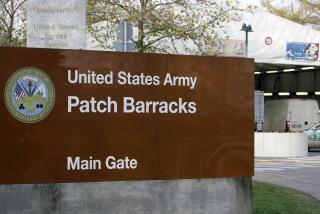U.S. Commander Cites Threat in Iraq
- Share via
WASHINGTON — The leader of the U.S. Central Command on Thursday declared Iraq “the center of the global war on terrorism,” saying that attacks such the bombing of the U.N. headquarters in Baghdad this week were fast becoming the top security threat in the country.
“The terrorist threat that is emerging and is certainly becoming a problem for us is clearly being fueled by extremists within a fairly distinct geographical area -- Tikrit, Ar Ramadi, Baghdad,” said Gen. John Abizaid, describing the area known as the Sunni Triangle. “They are clearly a problem for us because of the sophistication of their attacks and because of what I would call their tactics to go after Iraqis.
“Clearly they’re going after Iraqis that are cooperating with us. They’re going after soft targets of the international community.”
Abizaid and Defense Secretary Donald H. Rumsfeld acknowledged that Iraq had become a magnet for militants who want to kill Americans, as a surge of foreign extremists continued to cross the country’s lightly guarded borders.
Abizaid echoed the sentiments of L. Paul Bremer III, the U.S. civilian administrator in Iraq, who has said that it is better to fight terrorists in Iraq than on U.S. streets.
“So wherever we find the terrorists, we will find them, capture them, kill them, fight them,” Abizaid said. “And we welcome the opportunity to do that because the region will not be safe and will not be prosperous until that threat is dealt with.”
Rumsfeld and Abizaid insisted that the 146,000 U.S. troops on the ground in Iraq were sufficient to combat the continuing guerrilla attacks on U.S. forces and a new wave of terrorist-style attacks on civilians.
No number of troops could guarantee security, Rumsfeld said, adding, “We have over 1 million people under arms in the United States of America, and it didn’t protect us from what happened on 9/11. And the Israeli army, for all of its strength, was not protected from what happened in Jerusalem the other day. I mean, terrorist attacks can happen regardless of the strength of the military commitment. But over time, you’ll see that we’ll continue to make good progress on security.”
Coalition officials have a rough picture of the anti-occupation foreign fighters entering the country and their nations of origin. But defense officials speaking on condition of anonymity said that although they knew that an undetermined number of Syrians were among them, it was unclear how many foreign fighters were entering Iraq or where they were coming from.
Suggesting cooperation among members of Saddam Hussein’s Baath Party and foreign fighters, Rumsfeld referred to “Baathists and their terrorist allies” but offered few details about the alleged connection.
“We have [a] clear indication of how the former Baathists are working. They work in cellular structure,” Abizaid said. “And the terrorists work in cellular structure. I wouldn’t say that they have become allies per se, but I believe that there are some indications of cooperation in specific areas. And, of course, ideologically, they are not at all compatible.
“But on the other hand, you sometimes cooperate against what you consider a common enemy.”
Abizaid also cited an increase in activity by Ansar al Islam, a group that Bush administration officials have linked to the Al Qaeda terrorist network and that had previously operated in Iraq’s autonomous Kurdish territory in the north. Intelligence reports now suggest that Ansar has migrated to Baghdad, launching attacks in urban areas, he said.
There is little evidence to suggest that fighters from Syria, Iran or elsewhere are participating in “state-sponsored terrorism,” Pentagon officials said.
But “they clearly are not being stopped by the countries from which they’re coming,” Rumsfeld said.
He added: “This much is certain: Their cause is lost. That regime will not be coming back. The coalition will not be dissuaded from its mission -- not by sabotage, not by snipers and not by terrorists with car bombs.”
More to Read
Sign up for Essential California
The most important California stories and recommendations in your inbox every morning.
You may occasionally receive promotional content from the Los Angeles Times.












